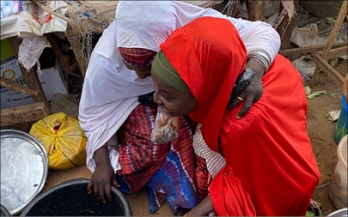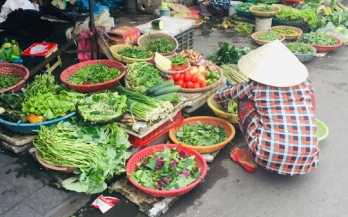This infographic has been prepared by GAIN based on the blog Keeping food flowing within African food systems by busting policy myths penned by GAIN's Executive Director Lawrence Haddad commenting on the paper "Essential non-essentials": COVID-19 policy missteps in Nigeria rooted in persistent myths about African food supply chains.
This qualitative thematic analysis provides recommendations for planning, designing, delivering, and evaluating training programs that intentionally incorporate social and behavior change communication media interventions.
This report examines prior research on food safety-related topics using ethnographic and related methods, then uses the results to glean insights for the design of EatSafe research and intervention activities.
The UN Food Systems Summit, UN Climate Change Conference (COP26) and Tokyo Nutrition for Growth (N4G) Summit will take place towards the end of 2021. All three events are key milestones on the road to recovery from the devastating impacts of the COVID 19 pandemic on food security and nutrition. The summits are also key moments to mobilize support for and prioritization of staple food fortification as a no-regrets, gamechanging intervention to fight disease and poverty among the world’s most vulnerable communities.
For millions of children in Eastern and Southern Africa and South Asia, current diets do not contain enough nutrients for proper growth and development. This is a tragedy. New evidence has recently been published that sheds light on the nutrient gaps experienced by young children in 14 countries in these regions and examines which foods might be affordably used to fill them. This briefing paper highlights the key findings from this research.
This report highlights the multiple and complex factors involved in mitigating foodborne zoonoses in animal source foods sold at traditional markets in resource-poor settings.
These briefs are part of a series on affordability of nutritious foods for complementary feeding by GAIN and UNICEF conducted in selected countries in Eastern and Southern Africa and South Asia as part of the UNICEF-BMGF Regional Initiatives for Sustained Improvements in Nutrition and Growth (RISING).
These briefs are part of a series on complementary feeding gaps by GAIN and UNICEF conducted in selected countries in Eastern and Southern Africa and South Asia as part of the UNICEF-BMGF Regional Initiatives for Sustained Improvements in Nutrition and Growth (RISING).
This review describes recent food safety interventions focused on traditional market settings and consumers who buy food there. Data was extracted from 19 and 23 articles from Asian and African countries, respectively.
When funds are needed to support your organisation - either as an MSME or NGO - a clear, structured and effective approach is necessary. The goal of this guide is to help actors involved in securing funding to understand the process and to access tools that can be used during the different stages to secure funding.










